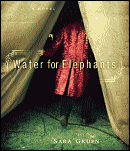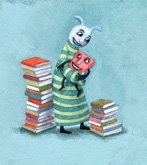
Nick Hornby quotes his good friend Sarah Vowell from Take the Cannoli, "Asked by a magazine to review a Tom Waits album, she concludes that she 'quite likes the ballads,' and writes that down; now all she needs is another eight-hundred odd words restating this one blinding apercu." And now here I am, quite liking the essays and needing to do the same thing.
Nick Hornby's collection of articles written for Believer magazine on his struggle between the books he brings into his house and the ones he's actually able to read is so relatable that it made me believe that I too could be a wildly successful pop novelist if not for the lack of talent, time, and friends in high places. In endeavoring to write these reviews for the TBR blog I resolved that I would only read and review books I've accumulated (and not yet read) through BookMooch and PaperbackSwap. The number of books coming in vs. the number being read has gotten to a point that my wife has demanded I stop requesting books altogether. I've agreed to stop adding books to my wishlist.
"Housekeeping vs. The Dirt" is the second volume of these collected articles following "The Polysyllabic Spree." The running theme through the essays month after month is a choice that all of us readers must make every time we decide to crack open a book and resolve to finish it: meaningful, difficult, classic literature or pop, easy, pulp fiction. He says in the preface, "One of the problems, it seems to me, is that we have got it into our heads that books should be hard work, and that unless they're hard work, they're not doing us any good." I relate. I love his honesty and ability to drop his guard that we'll think he's lacking depth. In fact, I believe his depth is quite evident when he actually begins writing the essays.
He eventually happens upon "Housekeeping" by Marilynne Robinson which he describes as "this extraordinary, yearning mystical work…" At this point, November 2005, the collection of essays take a turn, and he heaps unprecedented praise on Marilynne Robinson including calling her "one of America's greatest living writers." At the risk of contradicting much of what he's built his thesis around with this collection he says, "I have always prized the accessible over the obscure, but after reading 'Housekeeping' I can see that in some ways the easy, accessible novel is working at a disadvantage…" Oh Nick, say it isn't so. He goes on to equate how long it took him to read the book as one of these advantages: "If you are so gripped by a book that you want to read it in the mythical single sitting, what chance has it got of making it all the way through the long march to your soul?" In the space of two pages he flips his hypothesis on its ear and convinces me in the same breath.
I've never read any of Nick Hornby's fiction or purchased Believer magazine, but this collection of essays has made my own quest to read the avalanche of books crashing into my home feel noble in its own way. To find meaning in my life and connection between books simply because of where they sit on the shelf or the juxtaposition of two books being read simultaneously is all part of the wonderful experience of reading.
I'll leave you with another great quote that we can all remember when we're just not up for reading that classic behemoth and just want our best-selling, genre novel to sit on the beach with:
Nick Hornby's collection of articles written for Believer magazine on his struggle between the books he brings into his house and the ones he's actually able to read is so relatable that it made me believe that I too could be a wildly successful pop novelist if not for the lack of talent, time, and friends in high places. In endeavoring to write these reviews for the TBR blog I resolved that I would only read and review books I've accumulated (and not yet read) through BookMooch and PaperbackSwap. The number of books coming in vs. the number being read has gotten to a point that my wife has demanded I stop requesting books altogether. I've agreed to stop adding books to my wishlist.
"Housekeeping vs. The Dirt" is the second volume of these collected articles following "The Polysyllabic Spree." The running theme through the essays month after month is a choice that all of us readers must make every time we decide to crack open a book and resolve to finish it: meaningful, difficult, classic literature or pop, easy, pulp fiction. He says in the preface, "One of the problems, it seems to me, is that we have got it into our heads that books should be hard work, and that unless they're hard work, they're not doing us any good." I relate. I love his honesty and ability to drop his guard that we'll think he's lacking depth. In fact, I believe his depth is quite evident when he actually begins writing the essays.
He eventually happens upon "Housekeeping" by Marilynne Robinson which he describes as "this extraordinary, yearning mystical work…" At this point, November 2005, the collection of essays take a turn, and he heaps unprecedented praise on Marilynne Robinson including calling her "one of America's greatest living writers." At the risk of contradicting much of what he's built his thesis around with this collection he says, "I have always prized the accessible over the obscure, but after reading 'Housekeeping' I can see that in some ways the easy, accessible novel is working at a disadvantage…" Oh Nick, say it isn't so. He goes on to equate how long it took him to read the book as one of these advantages: "If you are so gripped by a book that you want to read it in the mythical single sitting, what chance has it got of making it all the way through the long march to your soul?" In the space of two pages he flips his hypothesis on its ear and convinces me in the same breath.
I've never read any of Nick Hornby's fiction or purchased Believer magazine, but this collection of essays has made my own quest to read the avalanche of books crashing into my home feel noble in its own way. To find meaning in my life and connection between books simply because of where they sit on the shelf or the juxtaposition of two books being read simultaneously is all part of the wonderful experience of reading.
I'll leave you with another great quote that we can all remember when we're just not up for reading that classic behemoth and just want our best-selling, genre novel to sit on the beach with:
"…here's something… no one will ever tell you: if you don't read classics, or the novel that won this year's Booker Prize, then nothing bad will happen to you; more importantly, nothing good will happen to you if you do." Thanks for the reassurance Nick.









